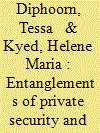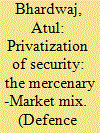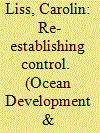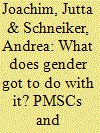|
|
|
Sort Order |
|
|
|
Items / Page
|
|
|
|
|
|
|
| Srl | Item |
| 1 |
ID:
147821


|
|
|
|
|
| Summary/Abstract |
Security in Africa is seldom a public good provided by the state, but is frequently something you pay for or acquire by turning to various non-state or community actors. The privatization of security in African cities is reflected in the rapid growth of the private security industry, which is matched by the widespread involvement of civilian actors in neighbourhood watches and self-organized policing groups. Much of the scholarly debate on ‘plural policing’ and ‘security assemblages’ has focused on what the privatization of security means for the state, highlighting how the public–private divide is increasingly blurred as state police services interact with either private or community security actors. This article adds a novel perspective by exploring the entanglements between private security companies and civilian community policing groups in urban areas of South Africa and Swaziland. Based on ethnographic fieldwork, the article shows how these actors engage with each other in different, often informal, ways and across socio-spatial boundaries. The result is the simultaneous communalization of private security and privatization of community policing. However, these are not straightforward processes. Sets of actors slip in and out of commercial and community logics of security, but also frequently articulate their distinctions as part of positioning themselves in a competitive security landscape, thereby raising questions about the objectives and motivations that drive many security performances.
|
|
|
|
|
|
|
|
|
|
|
|
|
|
|
|
| 2 |
ID:
121877


|
|
|
|
|
| Publication |
2013.
|
| Summary/Abstract |
This article explores the involvement of a range of diverse for-profit actors in providing port and border security in Indonesia. Using the port of Belawan, Medan, as a case study, the article demonstrates the critical, albeit controversial, role that private security providers play in security governance in Indonesia. After a discussion of port security and the notion of ports as borders, the paper provides an overview of the large number of state and non-state actors involved in providing security in the port of Belawan. Among the for-profit actors are guards hired by the state-owned port operator Pelindo I; Private Military and Security Companies (PMSCs) with links to the Indonesian military; and members of Pemuda Pancasila (PP), known to be involved in illegal activities in the port they help secure. The article argues that while some private actors do contribute to port security, the involvement of so many different types of state and non-state agencies has actually lessened security in Belawan. This is in part due to the nature of some of the agents involved - particularly the members of PP - and the problematic relationship and lack of cooperation between the different state and non-state actors.
|
|
|
|
|
|
|
|
|
|
|
|
|
|
|
|
| 3 |
ID:
109464


|
|
|
|
|
| Publication |
2011.
|
| Summary/Abstract |
The increasing privatization of security and the changing patterns of security governance call into question the foundational lines of demarcation between the "public" and "private." This article investigates how key actors in the security assemblage at Stockholm-Arlanda Airport make sense of their roles in relation to public-private distinctions. While central to the ways in which security actors understand themselves and each other, closer inspection reveals that the drawing of these lines is also highly ambivalent and contested-in relation to questions of control and regulation, authority, as well as security rationalities. Further, "private-private" and "public-public" contestations also are informed by the obdurate public-private distinction.
|
|
|
|
|
|
|
|
|
|
|
|
|
|
|
|
| 4 |
ID:
051822


|
|
|
| 5 |
ID:
139199


|
|
|
|
|
| Summary/Abstract |
In response to the increasing employment of Privately Contracted Armed Security Personnel (PCASP) to protect vessels against pirate attacks, some flag states introduced new regulations that allow the use of PCASP. The introduction of these new regulations was at least in part an attempt to (re)establish state control of violence. This article provides the background and theoretical framework for this special issue, which discusses how states with national registers approached the regulation of PCASP. Summarizing its major findings, the article concludes that even when states attempted to govern the use of PCASP, operational difficulties resulted in significant shortcomings in state control.
|
|
|
|
|
|
|
|
|
|
|
|
|
|
|
|
| 6 |
ID:
188321


|
|
|
|
|
| Summary/Abstract |
While war and the military have been recognized as being gendered sites, Private Military and Security Companies (PMSCs) are only rarely studied through a gender lens. Compared to functional, political-instrumental or ideational explanations with respect to the privatization of security, such a lens captures, however, the micro-dynamic and political processes of PMSCs’ boom. We show that gender is, first, constitutive of companies’ corporate identities as hero warriors and professional security experts. Second, it is relational, (re-)producing hierarchical power relations among and within PMSCs and with state security actors. Third, gender is a legitimizing factor helping PMSCs to establish themselves as acceptable security actors vis-à-vis others.
|
|
|
|
|
|
|
|
|
|
|
|
|
|
|
|
|
|
|
|
|